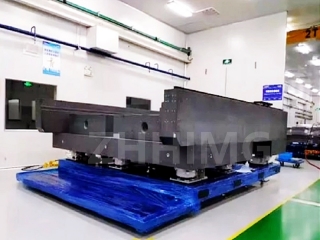In the field of intelligent manufacturing, the 3D intelligent measuring instrument, as the core equipment for achieving precise inspection and quality control, its measurement accuracy directly affects the final quality of the product. The base, as the fundamental supporting component of the measuring instrument, its anti-vibration performance is a key factor determining the reliability of the measurement results. In recent years, the application of granite materials in the base of 3D intelligent measuring instruments has triggered an industry revolution. Data shows that compared with traditional cast iron bases, the vibration resistance of granite bases has increased by up to 83%, bringing a brand-new technological breakthrough to precision measurement.
The influence of vibration on 3D intelligent measuring instruments
The 3D intelligent measuring instrument acquires three-dimensional data of objects through technologies such as laser scanning and optical imaging. The sensors and precision optical components inside it are extremely sensitive to vibration. In an industrial production environment, vibrations generated by the operation of machine tools, the start and stop of equipment, and even the movement of personnel can all interfere with the normal operation of measuring instruments. Even slight vibrations may cause the laser beam to shift or the lens to shake, resulting in deviations in the collected three-dimensional data and causing measurement errors. In industries with extremely high precision requirements such as aerospace and electronic chips, these errors may lead to substandard products and even affect the stability of the entire production process.
The vibration resistance limitations of cast iron bases
Cast iron has always been a commonly used material for the base of traditional 3D intelligent measuring instruments due to its low cost and ease of processing and molding. However, the internal structure of cast iron contains numerous tiny pores and the crystal arrangement is relatively loose, which makes it difficult for it to effectively attenuate energy during the vibration transmission process. When external vibrations are transmitted to the cast iron base, the vibration waves will repeatedly reflect and propagate inside the base, forming a continuous resonance phenomenon. According to the test data, it takes an average of about 600 milliseconds for the cast iron base to completely attenuate the vibration and return to a stable state after being disturbed by it. During this process, the measurement accuracy of the measuring instrument is severely affected, and the measurement error can be as high as ±5μm.
The anti-vibration advantage of granite bases
Granite is a natural stone formed through geological processes over hundreds of millions of years. Its internal mineral crystals are compact, the structure is dense and uniform, and it has excellent vibration resistance. When external vibrations are transmitted to the granite base, its internal microstructure can rapidly convert the vibration energy into thermal energy, achieving efficient attenuation. Experimental data show that after being subjected to the same vibration interference, the granite base can regain stability in about 100 milliseconds, and its anti-vibration efficiency is significantly better than that of the cast iron base, with an 83% improvement in anti-vibration performance compared to cast iron.
In addition, the high damping property of granite enables it to effectively absorb vibrations of different frequencies. Whether it is high-frequency machine tool vibration or low-frequency ground vibration, the granite base can minimize their impact on the measuring instrument. In practical applications, the 3D intelligent measuring instrument with a granite base can control the measurement error within ±0.8μm, which greatly improves the accuracy and reliability of the measurement data.
Industry Applications and Future Prospects
The application of granite bases in 3D intelligent measuring instruments has demonstrated significant advantages in multiple high-end manufacturing fields. In the manufacturing of semiconductor chips, the granite base helps the force measuring instrument achieve high-precision detection of the size and shape of the chips, ensuring the yield rate of chip manufacturing. In the inspection of aerospace components, its stable anti-vibration performance ensures the precise measurement of complex curved surface components, providing a guarantee for the safe operation of aircraft.
With the continuous improvement of precision requirements in the manufacturing industry, the application prospects of granite bases in the field of 3D intelligent measuring instruments are broad. In the future, with the continuous advancement of materials science and processing technology, the granite base will be further optimized in design, providing stronger support for the improvement of the accuracy of 3D intelligent measuring instruments and promoting the intelligent manufacturing industry to a higher level.
Post time: May-12-2025

